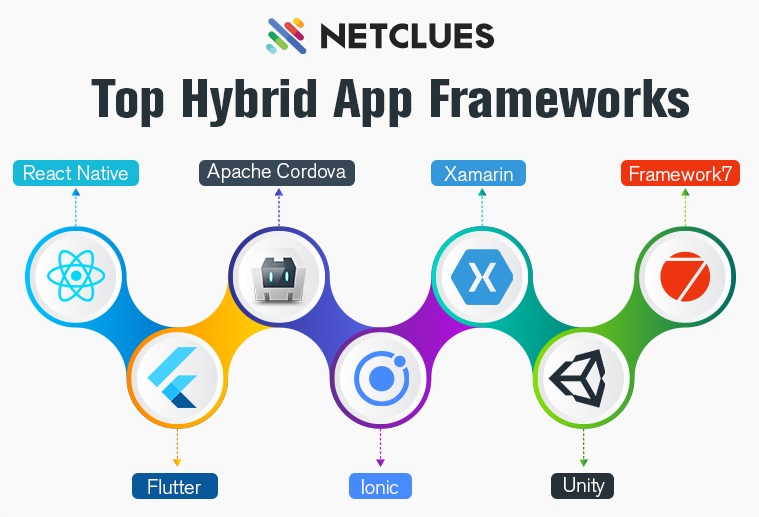
With people spending more time on phones, businesses realize the importance of mobile apps. However, choosing between native and hybrid apps can be confusing.
Many pick hybrid apps for their benefits, such as working on different operating systems, costing less, and being quicker to make. Forbes says most US retail apps use hybrid tech, like Facebook, X, Instagram, Gmail, and Airbnb.
But what exactly are hybrid apps? They blend native and web features, running on both Android and iOS. They're made with languages like JavaScript, CSS, and HTML5, which is great for businesses looking for budget-friendly options.
Hybrid apps work on various systems, from Android to Windows, using the same code. They offer smooth user experiences and are used by big companies like Meta, Pinterest, and Uber.
However, they might not suit every business. Consider their pros and cons carefully before deciding.
Native vs. Hybrid App Development
If you plan to build a mobile app to grow your business, you have two choices: native or hybrid. Your pick depends on your project's complexity, budget, timeline, and who you want to reach.
Native apps are developed for specific platforms, either iOS or Android, but not both. They're good because they can use all the device's features for better performance and security. But they can cost a lot to make and maintain. If you focus on one platform or need top performance, go with native.
Hybrid app development lets you write and use one code on different platforms like Android, iOS, and Windows. It's more flexible and cheaper since you only have to work on one codebase. However, building hybrid apps requires more code for different systems and versions.
Pros and Cons of Hybrid App Development
Pros:
- Works on different platforms
- Faster to build than native apps
- Cheaper to develop than making separate native apps
- Easier to update and patch
- Works both online and offline
Cons:
- Quality may vary if developers focus more on one platform
- Appearance might differ between platforms
- Requires testing on various devices
- User experience may suffer if the interface isn't familiar or well-designed
In the world of hybrid apps, some really stand out. Let's check out a few of the best ones: Facebook, Spotify, X, Airbnb, Uber, Pinterest, and WixApp.
How Hybrid Apps Work
Hybrid apps are like web apps wrapped in a native shell. When you download and install them, the shell taps into the device's capabilities, just like a browser would. The browser and its plug-ins work behind the scenes and aren't visible to you.
They're similar to web apps but are downloaded directly to your device like native apps. They're built using HTML5, CSS, and JavaScript, and they use the device's browser engine to access hardware.
Hybrid apps share navigation with web apps, but whether they can work offline depends on their features. If they don't need a database, they can work offline.
Partner with a dedicated hybrid app development team to achieve innovation and success.
Top Features of Hybrid Apps
- Works online or offline
- Easily integrates with various device file systems
- Links up with other web services
- Includes a built-in browser for accessing dynamic online content
- Portable across multiple platforms with one source code
- Can handle software and hardware functions using plug-ins
- Cost-effective for businesses
- Quick and simple development with many features
Top Hybrid App Frameworks

Today, there are many options for hybrid app development. Each one has its own pros and cons, so choosing the right one for your project is important.
React Native:
Facebook announced this hybrid application framework in 2015. React Native is a cross-platform mobile app framework built with React and JavaScript. Using JSX, you can design multi-platform user interface components that are then linked to native code for Android and iOS.
Flutter:
Flutter is a famous app-making tool that's liked because it's not just for phones. Google made Flutter, and it uses its own language, Dart. Even though it's new, lots of developers like it because it's fast and works on phones, computers, and the web.
Apache Cordova:
Many famous companies like Siemens and DAZN use Apache Cordova structure, an open-source framework that enables you to create mobile apps using regular web technologies. Cordova apps run in a native application wrapper.
Ionic:
This popular framework uses HTML, CSS, and JavaScript to develop apps by mobile app development services providers. It's known for its ease of use and built-in support for AngularJS, making it attractive for front-end developers.
Xamarin:
This coding structure created by Microsoft, Xamarin, allows you to build mobile apps using dot NET and C# programming. You can access Xamarian-built APIs for iOS, Android, and Windows.
Unity:
The hybrid app framework, Unity, is mainly used for developing games and graphics-intensive apps like VR and AR experiences, but it can also be used for mobile and web apps. It uses C# as its programming language and is highly flexible, allowing it to create unique features and support complex game designs.
Framework7:
Framework7 is an open-source framework for creating mobile and web-based applications. It provides a native feel and appearance and supports popular JavaScript frameworks like React, Vue, and Svelte. Many famous IT companies, including Infosys, Fujitsu, and BCBS, use it for their applications.
The right framework depends on team skills, experience, project needs, scalability, and budget. All hybrid frameworks are excellent choices that should meet the requirements of most developers, but we would suggest you consult a hybrid app development company to determine which one suits your needs better.
Final Thought
In today's competitive business environment, apps have become crucial tools for all businesses. Hybrid apps appeal to businesses seeking cost-effective, scalable, high-performing mobile apps.
To make the selection easier, Netclues can assist you in designing and developing the best hybrid app for your business globally at an affordable price and in a short period of time.
Contact us now for more details..




